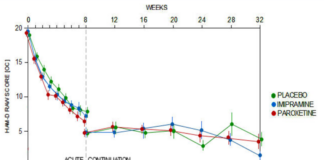Tag: antidepressant withdrawal
Antidepressants and Withdrawal: Readers Tell Their Stories
More than 8,000 people responded to the recent New York Times article on antidepressant withdrawal. Here, reporter Benedict Carey describes differences in the way various...
Antidepressants and the Problem of Withdrawal
In this episode of WBUR's On Point Radio, Benedict Carey, author of the recent New York Times report on antidepressant withdrawal, discusses the topic of discontinuing...
I’m Withdrawing From Antidepressants After Nearly 20 Years
From The Lily: In light of the recent New York Times article highlighting the effects antidepressant withdrawal, Ashley Abramson shares her personal story of deciding to...
Many People Taking Antidepressants Discover They Cannot Quit
From The New York Times: Global prescription rates and long-term use of antidepressants are rising rapidly. One unanticipated consequence of this trend is that more...
New Programme Supports Withdrawal From Antidepressants
Manasa Ayurveda has launched a new harm reduction based program that will support people in tapering from antidepressant drugs.
"Manasa Ayurveda aims to work collaboratively,...
Antidepressant Anarchy in the UK
In this blog, I want to give some personal reflections on the events of the last few weeks in relation to the Lancet antidepressant meta-analysis and the lodging of a formal complaint with the UK Royal College of Psychiatrists. The issue of antidepressant withdrawal has been brought into the public eye in the UK like never before. What happens next will be very interesting.
Whose Interests Does the Royal College of Psychiatrists Really Serve?
When you consult the Royal College of Psychiatrists' website it proclaims that one of its primary aims is to "improve the mental health of individuals, their families and communities" — thus, to act in the public interest. Recent events at the Royal College concerning its public position on the Cipriani et al. antidepressants study put that proclamation in serious doubt.
Royal College of Psychiatrists Accused of Misleading Claims
From The Herald: A group of mental health experts and patients have submitted a formal letter of complaint accusing the Royal College of Psychiatrists of...
Professor John Read: The Royal College of Psychiatrists and Antidepressant Withdrawal
Patients, academics and psychiatrists formally complain that the president of the UK Royal College of Psychiatrists has misled the public over antidepressant safety. Professor John Read talks to us about recent events.
Formal Complaint to the UK Royal College of Psychiatrists
Professor John Read and colleagues recently wrote to the President of the UK Royal College of Psychiatrists to raise concerns about statements made in a letter published in the Times newspaper. Having not received a satisfactory response to this letter, Professor Read and colleagues have today lodged a formal complaint with the Royal College of Psychiatrists.
Anti-depressants: “I’ve Lost My Identity and Who I Am”
From BBC: Mad in America Radio Host and Program Director James Moore speaks about the impact that antidepressant withdrawal has had on his life.
"The 46-year-old has...
Woman Shares How Coming Off Antidepressant Ruined Her Life
From Metro: Originally prescribed the antidepressant Venlafaxine for migraines and persistent low moods, Tabitha Dow shares some of the persistent, debilitating symptoms she continues to...
Study Examines the Difficulty of Withdrawing from Antidepressant Drugs
Correcting unnecessary long-term antidepressant use is difficult and met with apprehension by providers and service-users.
My Drug Dealer Was a Doctor: A Story of Withdrawal
In this piece for Medium, Michael E. Lee tells his story of experiencing the horrific withdrawal effects of Effexor, and how he healed from his...
People Are Hacking Antidepressant Doses to Avoid Withdrawal
From New Scientist: Some organizations are helping people hack their dosing regimens so they can taper off psychiatric drugs without severe withdrawal effects. One Dutch organization...
Going Off My Meds Gave Me Rage Attacks
In this piece for Glamour, Suzannah Weiss tells her story of SSRI withdrawal, which resulted in intense rage attacks for six months after discontinuation and...
The Truth About Long-Term Antidepressant Use
From The Guardian: As antidepressant prescriptions rise and have doubled in the past decade, mental health experts are becoming increasingly concerned about adverse effects and...
Public Petition: Support for People Affected by Prescribed Drug Dependence
People from any country can sign our petition until May 10th, then it will be lodged for consideration and further action by the Scottish Parliament Petitions Committee. This promises to be an interesting process — one which we hope will have a much wider impact.
Petition to Give Better Support for Those on Antidepressants
From Daily Express: A patient advocacy group has launched a petition at the Scottish Parliament requesting improved support services for people withdrawing from antidepressants. People from...
How Long Should you Stay on Antidepressants?
From The Guardian: Antidepressants may be addictive; many people experience withdrawal symptoms after stopping them. Some psychiatrists suggest that long-term usage may be harmful and...
‘Doctors Gave Me Depression Pills I DIDN’T Need for 20 Years’
Luke Montagu writes in the Daily Mail, "Six years after taking my last dose of antidepressants, I am still suffering from their effects. I...
The Real “Mental Illness” Epidemic: Withdrawal from Antidepressants
If the incidence of mental illness has remained the same, but an ever-increasing percentage of the population takes psychiatric medications, then these drugs are being over-prescribed. Now there is an epidemic of people trying to stop SSRI antidepressants, and the effects can be crippling.
Study 329 Taper Phase
Most doctors still affect surprise at the idea SSRIs might come with withdrawal problems. Regulators knew very clearly since 2002 about the problems, but have decided to leave any communication of these issues in company hands.
Study 329 Continuation Phase
All the fuss about Study 329 centers on its 8-week acute phase. But this study had a 24-week Continuation Phase that has never been published. Until Now.
I am Insane
I have been here at Western State Hospital for almost five years. While I’ve been told that I’ve met all the criteria for a conditional release, the hospital won’t grant me this because I can’t prove that I won’t be dangerous in the future. Can anyone prove this? Even convicts don’t have to prove they’re ‘safe’ before they are freed.
































